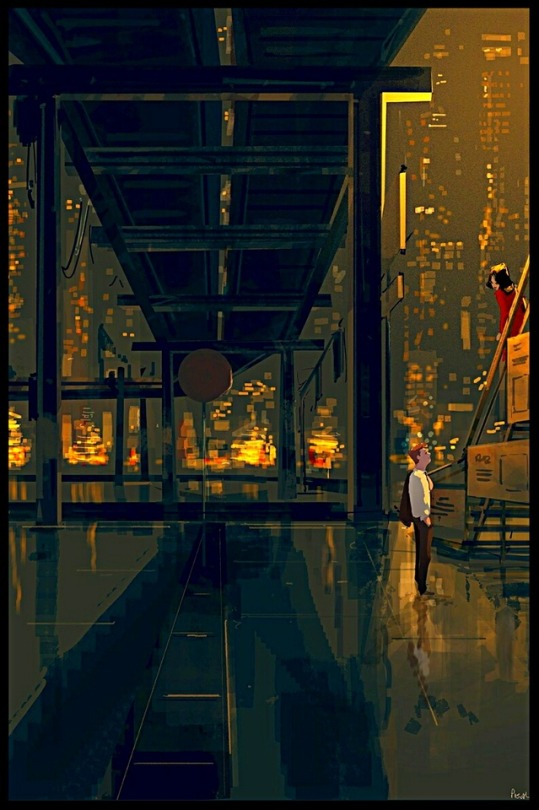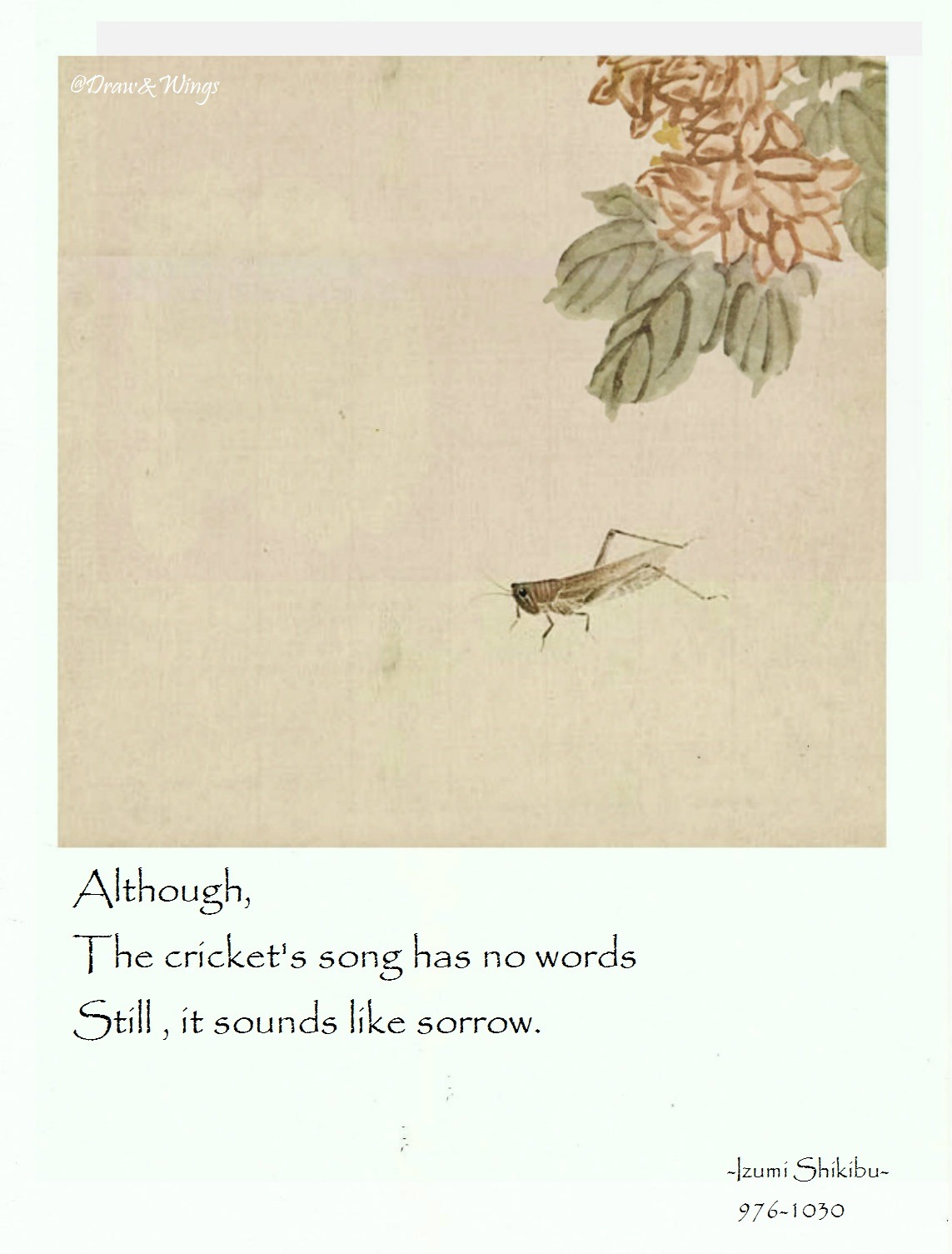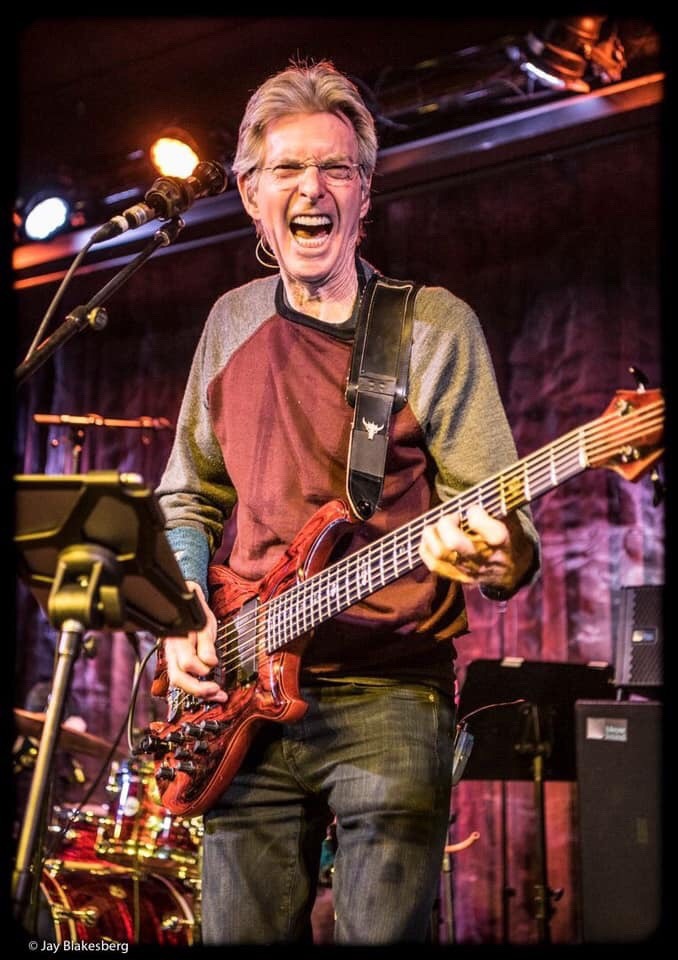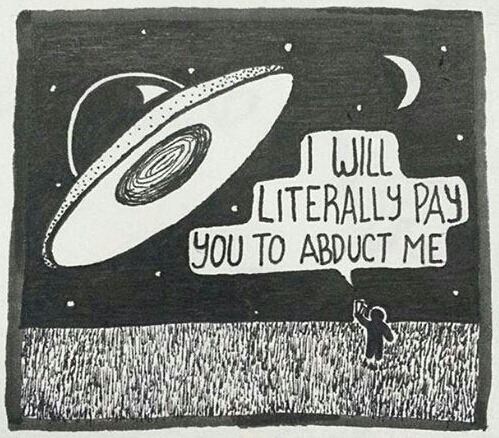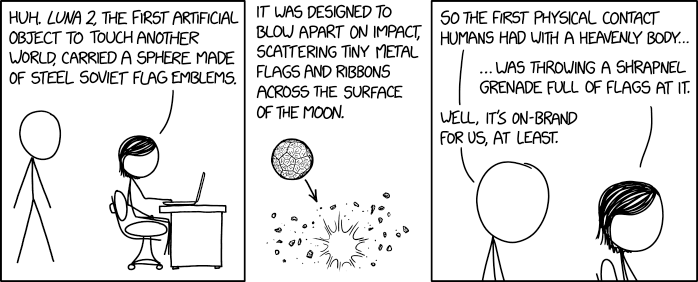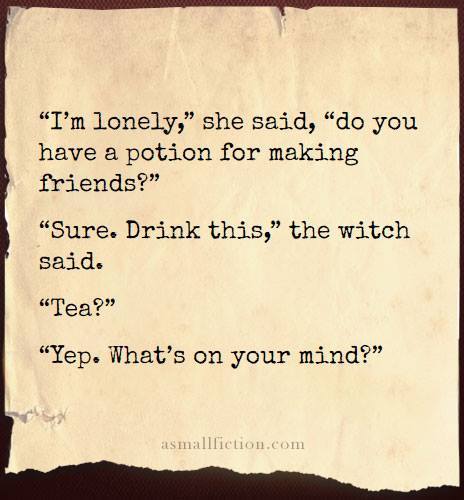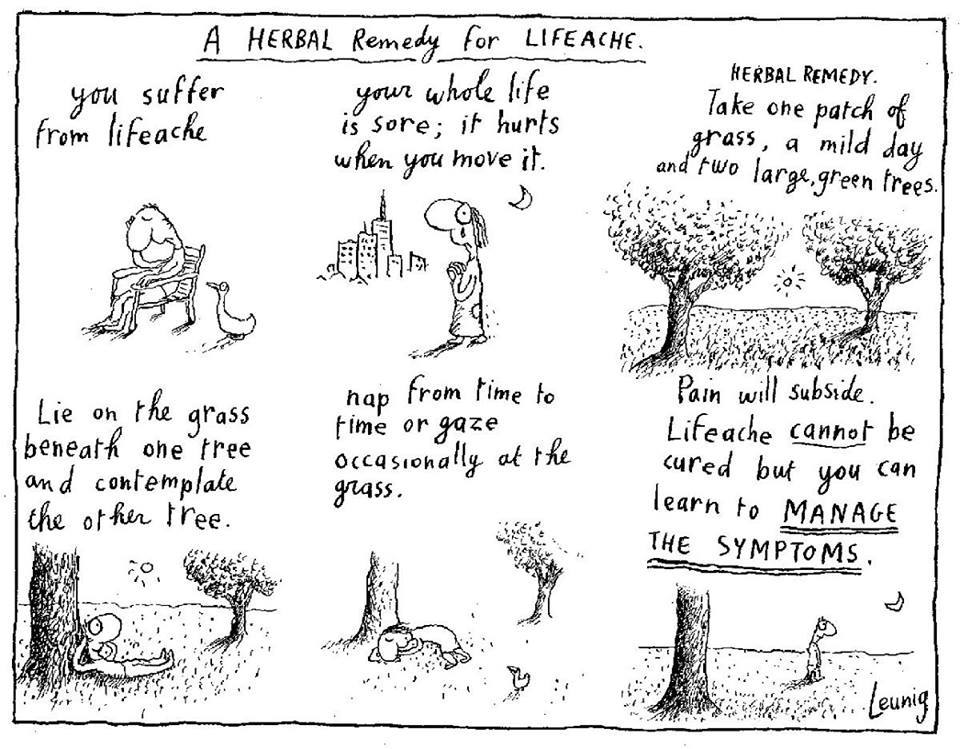 Comic by Michael Leunig.[/caption]
Comic by Michael Leunig.[/caption]
Sunday, March 31, 2019
Heroism Involves
“Jesus Christ eat the goddamn mac and cheese.” scowls the hero “I can hear your stomach growling through your armor, you know.”
The villain blinks “You-”
“Are feeding you, yes. If all I wanted to do was punch people and throw criminals in jail, I would’ve become a vigilante. Heroism involves kindness, dipshit.”
Saturday, March 30, 2019
Friday, March 29, 2019
Thursday, March 28, 2019
Control
We like to imagine that our life follows some kind of trajectory, like the plot of a novel, and that by recognizing its arc we might, in turn, become its author. But often what we feel instead is a sense of precariousness-- a gut-level suspicion that hard work, thrift, and following the rules won't give us control over the story, much less guarantee a happy ending. For all that, we keep on hoping, and that persuades us to keep on living.
Tuesday, March 26, 2019
None Of Us Knowing
"It was snowing-- big wet flakes that melted down our collars. God, we were drunk! Laughing, balancing on the icy railing of the University Bridge. Making faces at the bundled-up burghers and their fat ladies who huffed and puffed past, spouting steam and never giving us a glance, and none of us-- not even the burghers-- knowing that we were living our happy ending in advance…" ~excerpted from The Man Who Painted the Dragon Griaule by Lucius Shepard, ©1984
Monday, March 25, 2019
When the Trip leads to a Fall
Sunday, March 24, 2019
Fades to Black and White
To someone who is depressed, the world can seem flat or dull. This was long thought to be purely psychological. It turns out, though, that depression may affect how the eyes function—altering visual perception in a way that actually makes the world look gray, reports the November 2010 issue of the Harvard Mental Health Letter.
I remember trying to describe this to people, and they thought I was exaggerating for dramatic effect.
I wasn't.
Friday, March 22, 2019
A Bunch of Atoms
"I want to make it clear we are not a cult. Jerry Garcia was not the messiah. We weren't gods. We were there every night for the same reason the Deadheads were. We wanted the music to take us to a place of transcendence and elegance. We wanted to reach that group consciousness so we could realize that there was something that was bigger than us-- and whatever it was, we all were an equal part of it, from the guys sweating it out onstage to the girls in line for the bathroom. We are all the same and we are all just a bunch of atoms." ~Bill Kreutzmann
Thursday, March 21, 2019
Wednesday, March 20, 2019
An involuntarily silent, gliding gait
He wakes up slowly, mistily, dizzily, with a vague memory of having fallen asleep on plush. He is intensely miserable, bound down to his bed on hoops of steel, and the memory adds nausea to the misery, solidifying ticklishly around his bare hands and the back of his neck as he drifts towards wakefulness. His stomach turns over with the dry brushy filthiness of it. With the caution of the chronically ill, he opens his eyelids, careful not to move, careful even to keep from focusing his gaze until-- he thinks to himself-- his bed stops holding him with the force of Hell and this intense miserable sickness goes down, settles… Darkness. No breath. A glimmer of light, a stone wall. He thinks: I'm dead and buried, dead and buried, dead and-- With infinite care he attempts to breathe, sure that this time it will be easy; he'll be patient, discreet, sensible, he won't do it all at once--
He gags. Spasmodically he gulps, cries out, and gags again, springing convulsively to his knees and throwing himself over the low wall by his bed, laboring as if he were breathing sand. He starts to sweat. His heartbeat comes back, then pulse, then seeing, hearing, swallowing… High in the wall a window glimmers, a star is out, the sky is pale evening blue. Trembling with nausea he rises to his feet, sways a little in the gloom, then puts out one arm and steadies himself against the stone wall. He sees the window, sees the door ahead of him. In his tearing eyes the star suddenly blazes and lengthens like knife; his head is whirling, his heart painful as a man's; he throws his hands over his face, longing for life and strength to come back, the overwhelming flow of force that will crest at sunrise, leaving him raging at the world and ready to kill anyone, utterly proud and contemptuous, driven to sleep as the last resort of a balked assassin. But it's difficult to stand, difficult to breathe: I wish I were dead and buried, dead and buried, dead and buried-- But there! he whispers to himself like a charm, There, it's going, it's going away. He smiles slyly round at his companionable, merciful stone walls. With an involuntarily silent, gliding gait he moves towards the door, opens the iron gate, and goes outside. Life is coming back. The trees are black against the sky, which yet hold some light; far away in the West lie the radiant memories of a vanished sun. An always vanished sun.
'Alive!' he cries, in triumph. It is-- as usual-- his first word of the day.
Tuesday, March 19, 2019
Monday, March 18, 2019
Change
But it's also one of the best books about change-- the inevitability of change and resistance to change-- that I've read in a long time. It really helped me to understand the times we're living in.
The book is available online from The Z-Library Project, HERE.
Saturday, March 16, 2019
Once In A While
Once in a while
you get shown the light
in the strangest of places
if you look at it right…
Full lyrics at The Annotated Grateful Dead.
Wednesday, March 13, 2019
Life is a Rock
This song is stuck in my head.
I suppose it could be considered a precursor to rap, but I don't know that it was really influential; just fun. I like the way it opens with a deep breath. :D
Saturday, March 9, 2019
Swindell Swindle
Mr. Swindell explained to me that the A&P sold butter in two forms-- "print" butter in quarter-pound sticks wrapped in paper printed with the dairy's name, and a cheaper butter that came in bulk in wooden tubs and set on the floor open to dust and insects. When bulk butter was sold, it was scooped into pressed cardboard trays and weighed on a scale with a sliding balance out of the customers' sight. Mr. Swindell explained to me that when I weighed butter for black customers, "You should set the balance about here," he said, placing the balance weight at thirteen ounces. If the weight was out of sight of the customers, it was also out of sight of the store manager. I always set it for a pound at nineteen ounces.
Thursday, March 7, 2019
And I Knew Before I Answered
It was in Pittsburgh that I got the telegram. "Come home at once. Mother is dying." I stood holding the telegram in my hands, sick at heart, remembering a thousand things all at once. How gentle she was, how kind, the way her hair curled around her face when she was flushed from dancing, the way she sat so straight in church holding her prayer book, the soft way she called me "Lawrencell." I felt so guilty, because I knew she had been ill with diabetes for some time, and even though I had tried to get home and see her as often as I could, I knew I hadn't gotten there often enough. The last time I had talked to my sister Agatha she had said, "Mama wants to see you, Lawrence. Come home as soon as you can."
And now it was too late. But I felt I had to try and see her. We were playing on tour at the Kennywood Amusement Park at the time and I went in to the manager and explained the situation to him. He was sympathetic. "Go ahead, Lawrence. You can fly in and see her and probably be back for the show tomorrow night."
I threw some things in a bag and drove quickly out to the airport. The weather was bad and the fog blowing in from the Ohio River grew progressively heavier as I drove. When I arrived, the man at the ticket desk said, "I'm sorry, Mr. Welk. All the planes have been grounded for a while. There'll be an indefinite delay."
I sat down to wait, and in spite of myself my eyes filled with tears. I longed to see my mother one more time and tell her how much she meant to me. None of us in our family had ever been very good at expressing ourselves verbally; instead, we had shown by our actions how felt about each other. My mother had shown us more love than any human being could rightfully expect. I loved her, and I wanted to tell her so.
I paced the floor of the airport for a while, watching the fog grow thicker and thicker, clustering around the dim lights on the runway until they were blacked out entirely. Finally the manager came over to me and said, "There's no use staying, Mr. Welk. All the planes are grounded for the night. You can't possibly get out of here now."
I got into my car and drove slowly back to town, much of the time with the door open so I could see more clearly where I was going. I had just gotten into bed in my hotel room when I heard the phone shrill. And I new before I answered, what it was.
It was my brother John. "Mother just slept away very peacefully," he told me. "We were all here with her."
I couldn't answer him. "Are you there?" he asked me finally.
"Yes. Yes I am, John. I tried to come home, but all the planes are grounded here."
"Yes, I know," he said. "We heard about the weather. Don't try to come home, Lawrence. It's too dangerous. I'll keep in touch with you."
He hung up, and I felt like a small boy again. Both my parents were gone, and even though I hadn't seen either of them very often in the past few years, I felt as if a whole piece of my life had died with them. My childhood, all the things they had spent so many years teaching me, all the kindness and goodness they had shown me, was all gone now. My mind was full of memories that night and I was very lonely.
I was unable to get home for the funeral services. I knew they would be held at St. Peter and Paul's Church, which had been such a big part of my mother's life. I knew that my brothers and sisters and all the grandchildren would be there, and the priest who knew her so well would speak the words of the Faith she loved so much. I could not truly weep for my mother, whose whole life was a living testimony to the faith she believed in, but I did weep-- I guess for myself-- for the next three days. I stood on the bandstand at the amusement park and smiled and played the accordion while the tears just rolled down my face. I couldn't seem to stop them. I could not help remembering that if it hadn't been for my mother I would never have gotten an accordion in the first place. I would never have been able to realize so many of the youthful dreams which had seemed so unattainable to everyone else but her.
I owed so much to her, and I hadn't been able to tell her at the end how much I loved her. And now I never would.
He lamented several times in his book that his mother wasn't there to share his successes with him.
I don't think he ever really got over the loss.
Wednesday, March 6, 2019
Remove the dark from in me
I need someone to show me
Illumine my consciousness
Remove the dark from in me
And give me that which I have lost…
The melody is so bouncy and playful that the richness of the lyrics sneaks up on you. It's one of my favorites of his.
Full lyrics HERE.
Forever In Flux
"As human beings we share a tendency to scramble for certainty whenever we realize that everything around us is in flux. In difficult times the stress of trying to find solid ground-- something predictable to stand on-- seems to intensify. But in truth, the very nature of our existence is forever in flux. Everything keeps changing, whether we’re aware of it or not." ~Pema Chödron
There's a popular political movement based on recreating the past. They want to bring back 20th century jobs, 20th century industries, 20th centuries systems and mores.
I understand the appeal.
But it won't work.
Monday, March 4, 2019
Vulnerable Human Beings
Some of the bewilderment and pain began to lift the moment I returned (home) to Yankton, and a day or so later when I dropped into church for some quiet reflection I had a sudden flash of insight which helped me very much at the time and has helped greatly all my life. I realized that we are all vulnerable human beings, and whenever we put our love and faith into another human being, we are open to hurts and disappointments. That's just part of life. We all hurt each other, completely unintentionally at times. The only one to trust completely is God, and once you can understand that, and learn not to bear any malice or bitterness in your heart, your life will be much happier. I never again took anything quite so personally. I realized that the only important thing in life is to live it as well as you can. Everything else is secondary.
It is not he or she or them or it that you belong to…
It really reads better as a poem than as a song. Full lyrics HERE.
Sunday, March 3, 2019
Brushed My Hair Back
I had always thought my mother was beautiful, but she looked especially so to me as she held (my newborn daughter) Shirley for the first time. She settled down in her old rocking chair, cuddling Shirley close, murmuring soft German phrases to her, singing some old-country lullabies, as Shirley nestled contentedly in her arms. Suddenly the years melted away and I could remember her doing the same thing when I was a small boy. I realized with a pang that my mother was growing old. I didn't like to think about that. Instead I wanted to tell her how much I loved her. But, as usual, I couldn't quite get the words out. I sat down beside her, and she stopped rocking and reached out and brushed my hair back in the old way, and then she smiled at me, her eyes warm and tender as always.
I smiled, too. I loved her so much. But I couldn't seem to tell her.
That wasn't an uncommon problem for men of that generation. My own father is the same way. I don't think I've heard him say the words, "I love you."
But if you pay attention, he expresses it in other ways.
When the weather's bad, he calls to make sure I made it home safely. When I come over in the morning, he offers me a cup of coffee and a cookie. He cuts out coupons for me if he thinks they're something I could use.
You just have to know how to read the signs.
Neither Is The Cause of the Other
One popular misconception about astrology is that the planets out there in the heavens cause events to happen down here on the earth. Professional astrologers that I have known, and I have known many, do not hold with these theories of “celestial influence,” that planets somehow make things happen to us. Instead, modern astrologers see the heavens and the earth as one whole entity, interpenetrating, and sharing the same space and time, which in fact is the case.
They do not see the various planetary configurations as causing events to happen here on earth, but rather see the earth (itself a planet) and all the other planets as interacting in the very same space, and as sharing whatever events are occurring. In other words, whatever events taking place out there in the heavens are also happening down here on earth. Neither is the cause of the other; both are happening simultaneously. The planetary configurations are just grand signatures (like writing in the sky), signs of events happening right here in our own lives. Both are the product of the same moment, one acted out in the heavens above, the other here on the Earth below.
I've never seen astrology defined in such holistic terms before. I'm still not a believer, but I can appreciate the aesthetics of the viewpoint.
Saturday, March 2, 2019
Hell Hath No Fury
But, I could do worse:
[embed]https://www.youtube.com/watch?v=fUYaosyR4bE[/embed]
[embed]https://www.youtube.com/watch?v=0WxDrVUrSvI[/embed]
